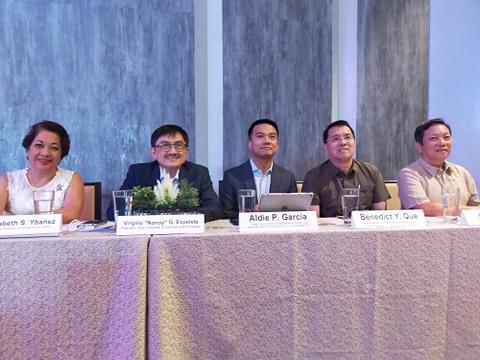CCCI Survey: Gov’t regulations, corruption among obstacles affecting Cebu’s competitiveness

The Cebu Chamber of Commerce and Industry holds a press conference to unveil the results of a survey on Cebu’s competitiveness. In the photo are (L to R) Elizabeth Ybanez, executive director; Virgilio Espeleta, president; Aldie Garcia, Board of Trustee member; Benedict Que, vice president-membership; and Felix Taguiam, vice president for finance and administrative services. | Irene R. Sino Cruz
CEBU CITY, Philippines–A survey conducted among Cebu businessmen identified government regulations and element of corruption as among the top obstacles to Cebu’s competitiveness.
The Cebu Chamber of Commerce and Industry (CCCI) conducted the survey on 204 business owners and executives to get the pulse of the Cebu business community on areas critical for the competitiveness of Cebu and their businesses.
“The survey aims to highlight obstacles and enablers directly impacting the competitiveness of Cebu,” said CCCI President Virgilio Espeleta during a press conference Tuesday afternoon, October 29, at Summit Galleria Cebu.
The chamber commissioned the PwC Philippines-Isla Lipana & Co. to conduct the survey.
As far as ease of doing business is concerned, the survey respondents identified two major concerns. These are the transparency of dealings with various government agencies and concern on informal payments.
The Department of Trade and Industry (DTI), Securities and Exchange Commission (SEC), Department of Information and Communications Technology (DICT), Armed Forces of the Philippines (AFP) and the Board of Investments (BOI) got ratings ranging from 7.73 to 6.13.
Those that have the lowest transparency rating among the 16 government agencies were the Bureau of Customs (BOC), Bureau of Internal Revenue (BIR), Bureau of Fire Protection (BFP), Department of Transportation (DOTr) and the Philippine National Police (PNP).
BOC received the lowest rating of 4.07 followed by the PNP with 5.45.
Aldie Garcia, a member of CCCI board of trustees, revealed that 20 percent of the 204 survey respondents admitted to having made informal payments to government agencies.
Of the 20 percent, 17 percent made informal payments because the government official or agency concerned asked for it.
On the other hand, 17 percent admitted they made voluntary informal payments to gain favors and/or advantage over other entities.
Meanwhile, 45 percent said they made informal payments due to the delays in processing transactions with government agencies. The rest gave different reasons for doing so.
The survey found that the top five government offices where respondents experienced making informal payments are the BIR, BOC, local government units, BFP and the Department of Environment and Natural Resources (DENR).
Espeleta explained that while the chamber wanted to reduce corruption in government, they also advocate to compliance with government regulations among their members.
Aside from government regulations and elements of corruption, the survey cited four other top obstacles.
Garcia said the survey also found that business leaders considered as obstacles the high cost of utilities and supplies; quality physical and technological infrastructure; lack of available talent and tight competition.
On the other hand, he noted that business leaders surveyed considered as top enablers the following:
– Linkages, partnerships and business networks;
– Lower cost if doing business;
– Access to credit and facilities;
– Upskilled manpower; and
– Good product quality.
Espeleta then emphasized that they conducted the survey so that government agencies can improve on their regulations and services to help improve Cebu’s competitiveness.
He added that their goal is for both government agencies and the business to have the ‘shared ambition’ of driving Cebu’s competitiveness to the next level. / dcb
Disclaimer: The comments uploaded on this site do not necessarily represent or reflect the views of management and owner of Cebudailynews. We reserve the right to exclude comments that we deem to be inconsistent with our editorial standards.
